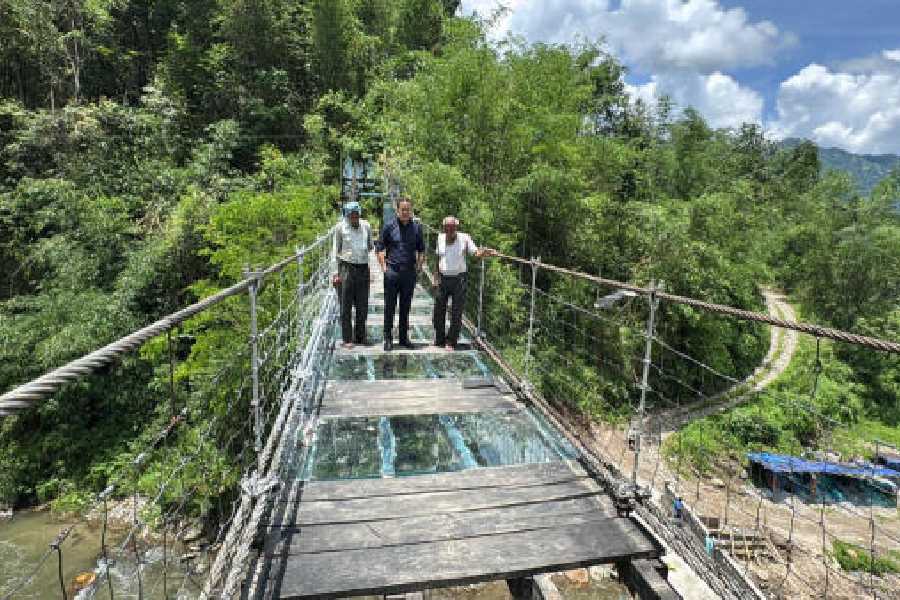
British-era suspension bridge in Darjeeling gets shape of skywalk with a glass bottom
Edwards and villagers pool resources for glass structure; plan to promote place as 'Tin Pul'
 |
Ajoy Edwards (centre) inspects the under-construction skywalk |
Vivek Chhetri, TT, Darjeeling, 21.07.24 : A British-era suspension bridge over the Chota Rangit river is being converted into a skywalk with a glass bottom in Darjeeling.
Hamro Party president Ajoy Edwards and residents of 20 villages in Singtom and Pulbazar-Bijanbari — which are connected by the bridge — collaborated for the skywalk in terms of money and labour.
The suspension bridge was built for people and horses to cross the river during the British era and was a part of the most used road during earlier times when business ties between Darjeeling and Pulbazar-Bijanbari were strong.
Villagers and Edwards had recently come under the banner of the Balabas Pul Nirman Committee and built a 130ft-long concrete bridge over the river, fulfilling a long-standing demand of the people in the region.
Upon the completion of the concrete bridge, Edwards came up with an idea to convert the suspension bridge into a skywalk to attract tourists.
“The suspension bridge is 160 feet long and hangs around 200 feet high from the river,” Edwards told The Telegraph.
The bridge will have a glass bottom for a stretch of 30 feet in the middle. “We are using 12mm tuffen glasses,” said Edwards.
Tuffen glasses are toughened tempered safety glasses that are much stronger than the normal glasses used in household construction.
The committee is planning not to allow more than 20 people to cross the bridge at any time as a precautionary measure.
Edwards contributed more than ₹35 lakh to the construction of the motorable bridge and the skywalk. The villagers have done labour mostly for free.
Edwards, however, does not want to stop with these two projects. “We plan to promote this place as a Tin Pul (Three Bridges),” said Edwards.
Former Darjeeling MP S.P. Lepcha had tried to build a motorable bridge over the Rangit using his MPLAD funds in the 1990s. However, only three pillars could be erected because of the paucity of funds and the bridge lies incomplete.
“We have drawn up a plan to construct a 600sfft coffee shop on the 45ft-high pillars. This, too, will be a unique initiative,” said Edwards.
Apart from the coffee house, the committee wants to introduce zipline, rock climbing and water activities in the area. “This place is about 3km from Sidrapong hydel project (the oldest hydel project in India) and also near Rock Garden and Gangamaya Park. We can create a tourism circuit,” said Edwards.
While the skywalk is expected to be completed in August, the committee wants to approach the Gorkhaland Territorial Administration (GTA), the Bengal tourism department and even Darjeeling MP Raju Bista to help complete the other initiatives.
“If we do not receive help from them, then we will take up these initiatives slowly,” said Edwards.
Even though Edwards contributed a substantial amount to the project, he stressed that the contribution of villagers was much more.
“When we had to cast a slab while constructing the motorable road, over 350 villagers turned up as volunteers,” said Edwards.
Apart from free labour, the villagers also help procure raw materials like sand and break stones from the river.

0 Response to "British-era suspension bridge in Darjeeling gets shape of skywalk with a glass bottom"
Post a Comment
Disclaimer Note:
The views expressed in the articles published here are solely those of the author and do not necessarily reflect the official policy, position, or perspective of Kalimpong News or KalimNews. Kalimpong News and KalimNews disclaim all liability for the published or posted articles, news, and information and assume no responsibility for the accuracy or validity of the content.
Kalimpong News is a non-profit online news platform managed by KalimNews and operated under the Kalimpong Press Club.
Comment Policy:
We encourage respectful and constructive discussions. Please ensure decency while commenting and register with your email ID to participate.
Note: only a member of this blog may post a comment.